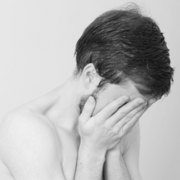Depression and anxiety are twice as common in gay and bisexual men as in heterosexual men. One reason for this is probably the many experiences of discrimination they have to deal with. This is not only a personal burden, but also jeopardises HIV prevention. The results of the pilot study "How are you?" now provide data on this.

Discrimination can make gay men depressed. This was confirmed by a pilot study carried out in summer 2012 with the support of Deutsche AIDS-Hilfe. Around 1,600 gay and bisexual men between the ages of 16 and 77 took part in the online survey entitled "How are you?". The analysis now available provides depressing figures: For a third (33 per cent) of respondents, the statements indicate increased depressive symptoms.
"These values are surprisingly high," write the study authors Dr Dirk Sander and Martin Kruspe, although they caveat: "The results are not necessarily clinically relevant, as it is not possible to determine how severe the reported symptoms really are." The survey data should also be interpreted with extreme caution, as the survey is not representative. However, these figures "already clearly show an increased need for preventative services".
Half of the respondents reported "rejection by family members"
One of the main reasons for the worrying figures is likely to be the various forms of discrimination that gay and bisexual men face. Half of those surveyed reported "rejection by family members". Around two thirds stated that they had experienced anti-gay verbal abuse. Experiences of violence were less common (25 per cent), but these had the greatest impact on the mental well-being of the participants.
The study also provides some pointers on how to prevent the development of depression. One factor was being open about one's own homosexuality. Respondents who had come out to "all" or "almost all" of their friends and acquaintances reported fewer depressive symptoms. A stable sex and relationship life also appears to have a favourable effect: Of the men who said they had not had sex in the twelve months prior to the survey, a higher proportion reported depressive symptoms (46 per cent) than those who had had one or more sex partners during this period (29 and 26 per cent respectively). Among respondents who were in a committed relationship, the proportion of those without depressive symptoms was significantly higher than among singles (76 to 58 per cent).
Social support had the strongest positive influence on the mental well-being of the respondents. This also corresponds to all available medical-psychological findings. The proportion of those who reported frequent depressive symptoms fell with the number of supportive people - from 74 per cent ("no one") to 21 per cent ("10 or more people").
Social support has the strongest positive influence
The study leaders concluded: "Social homonegativity obviously has a massive impact on the health of gay and bisexual men. Experienced stigmatisation promotes the internalisation of homonegativity and thus susceptibility to mental health problems." This not only favours uncontrolled drug use, but also prevents the successful prevention of HIV and other sexually transmitted infections. "Many men are so preoccupied with their mental stress that they are unable to make use of existing health services," says Dirk Sander, summarising the problem. "They don't have the nerve - in the truest sense of the word."
Interview with Dr Dirk Sander
In the following interview, Dirk Sander, DAH specialist for gay men, explains the results of the pilot study and the close connection between mental health and successful HIV prevention.
Dr Sander, gay and bisexual men suffer from depression much more frequently than heterosexual men. Why is that?
Coming out as gay doesn't end the day you tell your mum. Coming to terms with being gay in the eyes of others and society is a lifelong process. Some men experience this as stress and it can - along with many other factors - lead to depression in the long term.
At some point, the pot is full and the body says: "I've had enough!"
How does this "gay stress" arise?
The basic experience is coming to terms with homosexuality, which is met with at least reservations in all societies, often even outright hatred. There are also traumatic experiences, such as bullying at school or at work, and in the worst cases even violence. These stresses add up over the course of a lifetime and shape the personality. At some point, the pot is full and the body says: "I've had enough!" Then depression sets in.
Gay men are also more likely to consume alcohol and drugs. Is this a consequence of these stressful experiences - or perhaps also a cause of depression?
There is no simple answer to this because too many factors play a role here. With alcohol and drugs, for example, the question is why you take them: Is it to enhance existing pleasures? Or do they serve to block out negative experiences? The latter could be a very problematic strategy for coping with stress and could favour the development of depression.
But in Germany, the situation for gays is rosy. The constitutional court has just demanded full equality.

The political and legal situation of gay men has improved, that is true. But obviously such structural measures are not, or hardly, reaching the individuals. The individual is still exposed to strong stressors. Just one example: the marginalisation of homosexual young people in schools remains the same, even if marriage is opened up to adults. The same applies to individual experiences of violence. These have been analysed in Michael Bochow's studies since the end of the 1980s. That's how we know: The proportion of men who report experiencing anti-homosexual violence has not changed significantly over the last 25 years. This is also shown by the latest Bochow study from 2013.
Sounds hopeless.
This fact is not inevitable. But we have to deal with marginalisation and bullying. Many children and young people learn to withdraw at school. These are strategies for coping with stress that they will use for the rest of their lives. Social scientists refer to these as "coping mechanisms", of which there are problematic and recommendable ones.
Helpful: forming a community with other marginalised people
At school, for example, there is the opportunity to get together with other marginalised people and form a "community". I interviewed gay young people about this for a brochure on coming out, and they had very good experiences with it. For HIV prevention, Deutsche AIDS-Hilfe is therefore also focussing on community-building measures to strengthen self-esteem. In other words, we want to encourage men to internalise their gayness as a positive identity construct.
According to your study, depression also torpedoes the prevention of HIV and other sexually transmitted infections.
We know this from our local workers. They go into the gay scene and hand out condoms and safer sex information outside pubs, for example. They occasionally get the following feedback from customers: "Oh, leave me alone. I have completely different problems."
This statement must be taken seriously: Since the large EMIS study we know for sure that mental problems such as depression are the reason why gay men do not take advantage of health services. They are so preoccupied with their mental stress that they don't even think about dealing with protection messages or, for example, using HIV testing services. They don't have the nerve - in the truest sense of the word.
The more friends someone has, the less prone they are to depression
What helps against depression?
Our pilot study clearly shows that the circle of friends is important! The more friends or supportive relatives the respondents had, the less susceptible they were to depression. A stable social environment is a good immunisation against mental illness.
Having friends is easier said than done. How could you help those affected to make friends?
One possibility for AIDS service organisations and other prevention projects is, for example, going out groups. They offer newcomers an easy introduction to the gay scene. And in general, we endeavour to support these scenes in order to create a safe space. It is important that people have a place where they can be who they are, where they don't have to pretend.
In your study, you talk about a paradoxical effect: on the one hand, gay men who are open about their sexual orientation are less likely to suffer from depression. On the other hand, these same men report more frequent homonegative hostility. Does coming out ultimately promote depression?
The more openly a gay man lives, the more vulnerable he makes himself. However, whether the potential hostility makes him depressed depends on many factors, including his support resources. If you are isolated, hostility is naturally more problematic than if you have a stable circle of friends who can support you. However, the more open you are, the greater the risk of experiencing discrimination.









